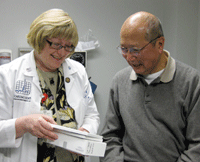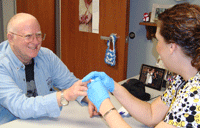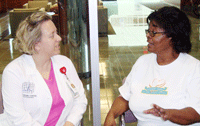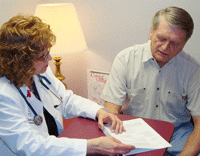Cardiology Research
School of Medicine Department of Clinical Research and Public Health

For more than 25 years, our Department of Clinical Research and Public Health has had the privilege and opportunity to participate in multiple prestigious international clinical trials that have refined our knowledge of how best to prevent and treat heart disease.
Our involvement in these trials allows us to offer our patients drugs, devices or treatments that might not otherwise be available. As we strive to contribute answers to the questions that remain, we offer a variety of research opportunities to our patients, whether healthy volunteers or cardiac patients. We conduct clinical research trials with the highest standard of care and with respect and appreciation for our patients, who make research possible.
What is Clinical Research?
Clinical research is an organized, scientific process by which evidence is gathered to answer a specific question. Usually in clinical research, the question to be answered has to do with the best medication or treatment for a specific disease process or its prevention. The process of bringing a new drug to market is a long and highly regulated process, involving multiple clinical trials. Identifying a new compound is only the beginning of the process. Before any new drug is tested on humans, it is extensively tested for safety and effect on the target disease. Following these investigations, there are four phases of clinical research studies, each building upon the other:
Phase 1 - Unusually involves a small number of normal, healthy volunteers and provides information about how the drug is absorbed, distributed, metabolized and excreted and the duration of its action
Phase 2 - Controlled studies of larger numbers of people who have the condition being studied to determine effectiveness of the drug
Phase 3 - Involves an even larger number of patients and aims to assess or confirm the efficacy of the drug and to monitor for adverse effects
Phase 4 - These studies are done on the drug after it is approved to compare it with other drugs or to test it for new uses or in new combinations
Are There Safeguards in Clinical Research?

There are many safeguards in place for patients who participate in our clinical research trials. Studies are designed with labs tests and other evaluations to monitor the safety of the drug. Each study has an independent data safety and monitoring board that reviews all the data in the study at intervals to determine continued safety.
Each research study at Creighton is reviewed and approved by Creighton’s Institutional Review Board (IRB)–a group of physicians and lay people who are not involved in the conduct of the study–prior to initiating the study. The IRB also reviews any study-wide safety issues and reapproves each study yearly. The study is also monitored by the trial’s sponsor and ultimately by the Food and Drug Administration (FDA), according to Good Clinical Practice Guidelines.
Prior to enrolling in a study, patients are given a thorough explanation of what the study involves, including risks, benefits and confidentiality of records. During this informed consent process, questions are encouraged and the candidate is given a copy of the signed informed consent, if they choose to participate. Study nurses and the primary investigator of the study also monitor research patients for safety throughout their involvement in a trial.
What Does it Mean to be a Study Participant?

If you choose to participate in a clinical trial, it is important to ask questions so that you understand everything about the research process. You may be expected to come into the clinic or be contacted by phone at routine intervals within specific visit windows. You will be informed before signing the informed consent what will be done at each visit.
If the study involves a medication, you will be expected to take it as directed, or to let your research nurse know if you are having any trouble with it. If for some reason you are not able to continue on a study treatment, you will be asked to be followed by phone for the length of the study.
Benefits of Participating in a Clinical Trial

It is possible that being involved in a clinical trial will provide no specific benefit. Participants may be randomly assigned to an active treatment or an inactive treatment known as a placebo and cannot be guaranteed that the treatment will improve their health or prevent disease. However, they may feel that the additional monitoring that is a part of most studies is helpful or that the study allows them to be more involved in their own health.
There may also be satisfaction in the contribution they are making to the prevention and treatment of heart disease in the future. We owe a debt of gratitude to those who have participated in clinical trials in the past, which have added to our current knowledge of the best treatments for heart disease.

















